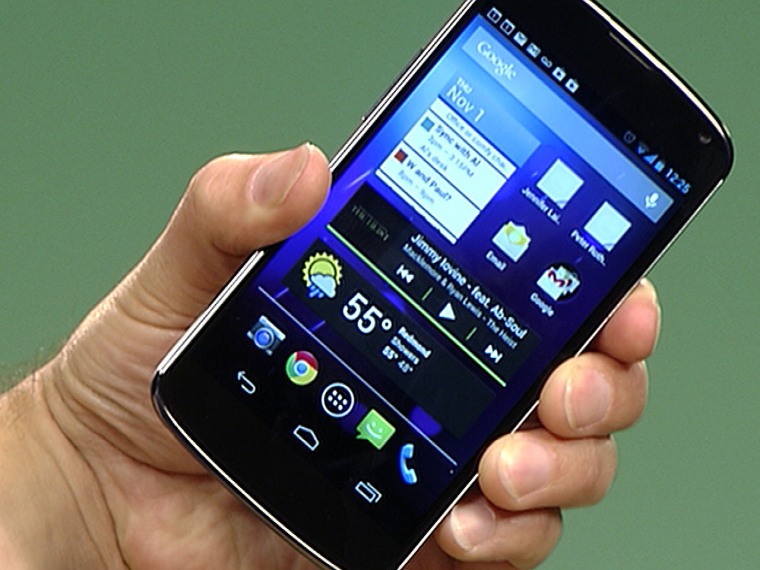The phone I'm most taken with at the moment isn't the iPhone 5. No, it's the Nexus 4 — a collaboration of Google and LG, representing the pinnacle of Android hardware and software. It runs smooth as butter, and has a vibrant screen that is second to none. But at its core is a fatal flaw, a deal breaker that illustrates my utter frustration with the whole Android platform.
Let me just spell it out: If the Nexus 4 represents the finest example of an Android phone — and I feel that it does — then why isn't it available on all carriers, and on the fastest 4G networks?
Now, to rewind a bit. A few weeks back, when the iPhone 5 came out, I decided to put my main phone number on the Samsung Galaxy S III instead. I wasn't falling for Samsung's glib anti-iPhone ads, but I wanted to make sure that, as a reviewer of all technologies, I wasn't missing something fundamental by keeping my personal phone service on iPhones. So began my Galaxy nightmare.
Seriously, I don't understand why people are so smitten with the Galaxy S III. For me, it's a battery hog (I can barely get through the day on a charge, even with light use), an eye sore (what was Samsung thinking when it mucked up Android this badly?) and a glitch bomb (ranging from missed text and calendar notifications to wonky headphone and Bluetooth connectivity). To top it off, it behaves jerkily, despite its 1.5GHz processor.
The Nexus 4 is a dream by comparison. It's sleeker in body, and the fact that it's thicker yet narrower than the Samsung means that I can hold on to it better. Like the Samsung, it is mostly plastic, but it doesn't have that plasticky feel that makes Samsungs seem undeserving of their high prices. I even like the way the back of the Nexus 4 shimmers like a disco ball when the light catches it a certain way. It's not flamboyant so much as it is tongue-in-cheek.
Most importantly, the battery lasts all day (and into the next), while the system responds to every gesture instantaneously, without a hiccup.
The Android 4.2 of the Nexus 4 barely resembles the Android 4.0 of the Galaxy S III, less because of the 0.2 jump in OS versions, more because of Samsung's meddling. The Nexus 4 software's design language is simpler, and its features — from voice command to camera functionality — are intuitive.
Photo Sphere, the new "amazing" camera feature from Android 4.2, is not so impressive, a pale ripoff of Microsoft's Photosynth, but who cares? That's just icing on the cake, and you can scrape it off if you don't like it. The perk that did matter was the gesture typing, essentially a very slick Swype-style keyboard.
Best of all, the home screen widgets have become even more resizable and customizable in Android 4.2, so that when you're glancing at the Nexus 4, you can really get a sense of what's going on in your life. This is not something you can currently do with an iPhone.
There are a few things I didn't get to try, but they will no doubt put added pressure on Apple. Android's new "wireless display support" sounds a lot like the AirPlay found on iPads and iPhones, and the customizable lock screen is one more way that Android lets you bring the functions of apps to the surface of the phone.
There, I've set it up: Impressive hardware, best Android software yet, definitely a threat to the iPhone … except. You hear that hesitation? So what's the catch? There are two that go hand in hand: Availability and network compatibility.
The only carrier actively selling this model will be T-Mobile, which is offering it for $199 with a 2-year contract. Mind you, if you're on T-Mobile, this is your next phone. You would be hard pressed to find anything remotely this good.
But if you're on every other carrier, you're basically out of luck. AT&T customers can buy the phone direct from Google, paying the contract-free price of $299, but they can't run it on their carrier's 4G LTE network, because it's not compatible with that technology. So no blistering speeds, sorry! And as for Sprint and Verizon, it's simply does not have the right guts. While this doesn't mean it won't ever make it to those carriers, it's a major timing blunder for Google and for LG, a company that could use a hit smartphone.
My takeaway is that Google either doesn't fully understand the situation or has trouble using the Nexus program to build clout for Android. Android is huge, but it's huge by default. The phones are cheaper than Apple's, the carriers make more money off of them, and the manufacturers license the operating system for little or nothing, and get to do whatever they want to their look and feel.
The result is that every single Android phone delivers a wildly different experience, and no two people who talk about Android are talking about the same thing.
What I see in the Nexus 4 is a great mobile OS, and a strong hardware platform to run it on. But the phones in the stores don't look anything like it. So I am left bitter for two reasons: That I can't have a Nexus 4 on Verizon, the carrier of my choice, and that among Verizon's 6,000 different Android models, not one comes close to resembling this beauty.
Wilson Rothman is the Technology & Science editor at NBC News Digital. Catch up with him on Twitter at @wjrothman, and join our conversation on Facebook.
